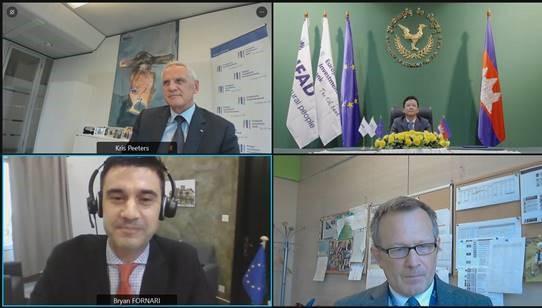
- The EIB has secured a €15 million grant from the European Union for the Sustainable Assets for Agriculture Markets, Business and Trade (SAAMBAT) project in Cambodia.
- SAAMBAT is designed to improve rural roads, nationwide connectivity and resilience to natural hazards, and tackle seasonal food shortages.
- The project will improve living conditions for 200 000 rural families, and create 4 500 jobs (with a special emphasis on young people) and 500 new small and medium-sized enterprises throughout Cambodia.
The European Investment Bank (EIB), the bank of the European Union, has secured a €15 million grant from the European Union to accelerate the implementation of the Sustainable Assets for Agriculture Markets, Business and Trade (SAAMBAT) project. The grant includes €1.5 million earmarked for technical assistance in project preparation, which will be key to faster implementation of the project.
SAAMBAT is a €105 million partnership investment made by the International Fund for Agricultural Development (IFAD), the EIB and the Royal Government of Cambodia. It is designed to improve living standards and the ease of doing business for some 200 000 rural Cambodian families by creating a reliable and safer road network year-round, better rural infrastructure and a reliable food supply.
The EIB initially invested €51.5 million in the project, complementing this investment with an additional €13.7 million as part of Team Europe support for Cambodia’s faster recovery from the COVID-19 pandemic.
With Team Europe and IFAD investments and grants, and funds from the Royal Government, Cambodia will build some 650 km of paved road and 150 km of gravel road, and improve 50 rural market areas and about 25 other value chain logistics facilities (ferry landings, produce collection points, etc.)
EIB Vice President Kris Peeters, who is in charge of EIB operations in Cambodia, said: “The EIB is very proud of our continued contribution to Cambodia’s faster recovery from the COVID-19 pandemic, but also to its long-term, sustainable and green development. As part of Team Europe, we are pleased to be recognised by the Royal Government of Cambodia as reliable partners in building a stronger, more resilient and safer Cambodia. This EU grant is another step towards an even closer partnership between the European Union and Cambodia and, more importantly, will have a direct impact on the quality of life of hundreds of thousands of Cambodians.”
Head of Cooperation at the EU Delegation to Cambodia Bryan Fornari said: “We are pleased to be part of the SAAMBAT rural road project, SAAMBAT, which will see thousands of Cambodia’s rural lives improved. With 105 million Euro of investment in Cambodia, SAAMBAT will help farmers and rural families to have better access to markets, supporting the growth of SMEs in the agriculture sector. This will contribute to the growth of rural economy and create new job opportunities in Cambodia's countryside. Through our work with European Investment Bank, this project brings the spirit of Team Europe to our partnership with the Royal Government of Cambodia, together with IFAD.”
HE Hem Vanndy, Secretary of State, Ministry of Economy and Finance of the Kingdom of Cambodia said: “The Royal Government of Cambodia welcomes the €15 million grant from the European Union for the SAAMBAT programme. The grant resources are an important contribution to the rapid and sustainable development of rural communities in Cambodia and to the green recovery from the global COVID-19 pandemic. Extending the benefits of the previously signed EIB financing, the EU grant will reinforce Cambodia’s climate change adaptation efforts. It is therefore a valuable investment in a safer future for our people and in the long-term sustainability of our national economy. We are very happy to see Team Europe providing hands-on support for the efforts of the Royal Government of Cambodia to build a safer, sustainable and prosperous future for our people.”
Key investment in rural infrastructure, a resilient rural economy and a reliable food supply
The SAAMBAT project will finance improvements in road infrastructure, road safety and the country’s resilience to natural hazards, and support the development of key rural infrastructure such as local markets. These are vital for Cambodia, where two-thirds of all rural households face seasonal food shortages every year due to underdeveloped infrastructure.
The project will also create up to 4 500 jobs and 500 new small and medium-sized enterprises, and train 25 000 Cambodians to use digital technologies to improve their businesses and increase trade.
Special emphasis will be placed on creating business and employment opportunities for the rural youth.
In the long term, SAAMBAT will strengthen Cambodia’s integration into the Greater Mekong Subregion (GMS) and cooperation with its ASEAN partners, while also supporting the EU-Asia Connectivity Strategy.
The project will be financed by a $53.3 million loan and a $1.2 million grant from IFAD, a €65.2 million loan from the EIB and a $12.41 million contribution from the Royal Government of Cambodia.
Background information
About the EIB in Asia:
For 25 years, the EIB has supported economic development in Asia and the Pacific region through projects ranging from cutting travel times for people in Bangalore with a new metro line, to providing cheaper, cleaner energy to western Nepal.
The EIB’s focus in Asia is our climate action lending across all sectors. Through our financing, we act as a catalyst to attract the funding needed to meet the UN Sustainable Development Goals for 2030. We also work to include gender equality in our projects, ensuring that women, men, girls and boys can benefit from projects equally and equitably.
About IFAD:
The International Fund for Agricultural Development (IFAD) invests in rural people, empowering them to reduce poverty, increase food security, improve nutrition and strengthen resilience. Since 1978, we have provided about $22.4 billion in grants and low-interest loans to projects that have reached some 512 million people. IFAD is an international financial institution and a specialised United Nations agency based in Rome – the UN’s food and agriculture hub.